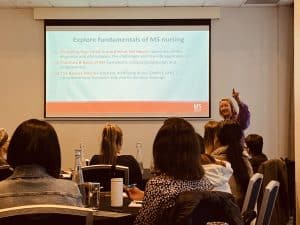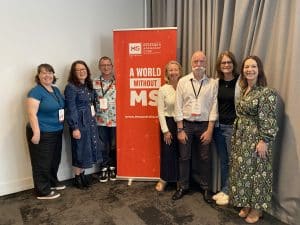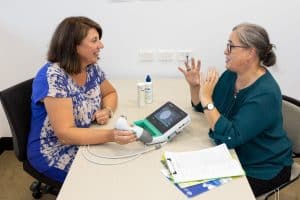- MS Nurses and other MS specialists met over three days to share the latest evidence in MS care
- The wide-ranging program included exercise as therapy, sexual health, pain management, and new treatments on the horizon in MS
- Highly experienced MS Specialist Nurses shared their expertise in the Foundations of MS Nursing course for new MS Nurses
From 16-18th October, MS Nurses Australasia (MSNA) held their annual conference in Auckland, bringing together over 100 delegates, including MS Specialist Nurses, MS Nurse Practitioners, neurologists and allied health professionals. The theme, “Weaving Knowledge – Strengthening Connections”, captured the collaborative spirit and the diverse program of this meeting. Experts shared the latest in MS diagnosis, best practice care, case studies, pain management, exercise evidence and more.
MS Nurses and MSNA
MS nurses are a subspecialty in neuroscience nursing. They are a dynamic group who work hard to deliver high quality, evidence-based nursing care for people with MS.
The pace of change in the field, and the need for specialised services for people with MS mean ongoing training is essential for MS Nurses. MSNA is the peak body for MS Nurses in the Southern Hemisphere, providing education and support for MS nurses and other health care professionals in Australia and New Zealand.

MS Nurse and MSNA member, Dr Therese Burke OAM, presenting on Fundamentals of MS Nursing to new MS nurses.
Strengthening connections
Foundations of MS Nursing
Prior to the conference, highly experienced MS Nurse Practitioners and MS Specialist Nurses conducted an intensive workshop, Foundations of MS Nursing, for new MS Nurses. Sharing decades of clinical experience through case studies, foundational principles and the latest evidence, the team empowered the next generation of MS Nurses with practical know-how and a new mentor network. MS Australia is working with the team to expand access to this training in the future.
MS Nurses Working Group
MS Australia’s 2022 MS Nurse Care in Australia Report found that access to an MS Nurse significantly improves symptoms and quality of life for people with MS. However, over 30% of people with MS in Australia do not have access to one.
Report author and MS Nurse Belinda Bardsley, who chairs MS Australia’s MS Nurses Working Group, outlined the group’s ongoing efforts to increase awareness and secure funding for MS Nursing positions in Australia. Economic analysis shows that government investment in additional MS Nurses would reduce costs by improving health outcomes for Australians with MS and decreased reliance on more expensive neurology and hospital services.
Weaving knowledge
MS Progression
New Zealand neurologist, Dr Benson Chen, gave an update on MS progression. While acute damage to the nerves occurs during periods of active inflammation (such as during MS relapses), another process known as progression independent of relapse activity (PIRA), has now been identified. While current disease modifying therapies (DMTs) target inflammation, new treatments in development aim to protect the nerves from damage (neuroprotection) and regrow the damaged myelin around nerves (remyelination) to address this progression. As these therapies become available in future, they might be used with current DMTs to address PIRA.
Menopause
Another neurologist from New Zealand, Dr Sarah Wright, discussed menopause in MS, which coincides with a time where relapse rates reduce and MS progression is more prominent. MS symptoms often increase at this time due to ageing, other medical conditions, and the overlap of menopausal and MS symptoms. More research is needed this area and holistic care is important for women with MS around menopause. Dr Wright recommended the Australian Menopause Society for evidence-based information on menopause. Read more on the latest Australian research on menopause.
Sexual health in MS
Dr Wright also discussed sexual function in MS. Up to 90% of males and 80% of females experience sexual dysfunction in MS, which can present very early in the course of MS. One of the biggest barriers to addressing these issues is not being asked about them during a clinical consult. There may be more opportunities to discuss these issues with an MS Nurse.
Guest speaker, Collette Haslam, a Clinical Nurse Specialist in Uro-Neurology at National Hospital for Neurology and Neurosurgery in London, specialises in this area.
She discussed the significant supports available, including pelvic floor physiotherapy, body mapping and education on sexual aids. Psychological support to manage changes in body image, body function and changing roles in intimate relationships can also be helpful.
Bowel and bladder wellness in MS
Continence MS Nurse specialist K-J Lazarus discussed the development of two new education resources to support bowel, bladder and intimacy wellness in MS. You can hear more from K-J in a recent Raw Nerve podcast episode. MS Australia will share the new guides when they are launched shortly.
High efficacy DMTs
Australian MS Nurse, Sharon Edwards, discussed the importance of high efficacy DMTs – medications that offer the strongest protection against relapses and disability progression – in MS management. Personal, emotional and social factors, along with life experience, influence how people perceive the risks of these therapies, which significantly affect the immune system and carry some risk of adverse effects. However, the chance of developing long-term motor disability from untreated relapsing-remitting MS is greater than 50%. As Sharon said, “The biggest risk is not taking any risk”.
The previous approach to MS care was to start treatment with older DMTs and escalate to newer high efficacy DMTs if required due to disease progression. Now, the consensus is that high efficacy DMTs should be used early in treatment. You can read more about this in the Brain Health: Time Matters 2024 Report. In Australia, high efficacy DMTs are available as first-line therapy, unlike many other countries.
Headaches and MS
MS Nurse practitioner Tim O’Maley, leads a headache clinic in addition to an MS Clinic. For people with MS, it is important to have headaches assessed as there can be MS and non-MS factors at play. Many “MS headaches” are not migraine, but tension headaches. Relaxation, stretching and exercise are important for tension headaches. Very regular light exercise can play a key role in migraine management. Sinus issues can be evident on MRI but can be overlooked if not the main indication for MRI investigation. Inadequate hydration and sleep issues (e.g. low oxygenation or “hypoxia” during sleep) are important factors to consider in headache management.
Assisted reproductive technology in MS
MS Nurse Practitioner, Susan Agland, is leading a research study on assisted reproductive technology (ART) in MS and Neuromyelitis Optica Spectrum Disorder (NMOSD), or (ARTiMS), for which there are currently no evidence-based guidelines.
The aim is to better understand how to coordinate MS/NMOSD care for women using ART and provide opportunities to measure and treat hormone level variability, as well as increased stress, anxiety and depression in women with MS or NMOSD using ART.
Susan emphasised the need to discuss family planning with women with MS early to coordinate MS care around these priorities. If fertility specialists are needed, MS teams need to communicate directly with them and other healthcare professionals involved to share expertise and coordinate care.
Evidence-based update on MS and exercise
Senior neurological physiotherapist, Gilly Davy, shared the latest definitive evidence that exercise has powerful effects and modifies disease in MS. There is more evidence for the benefits of exercise in MS than in any other neurological condition. Relapse rates are reduced by almost 30% in some studies, and exercise promotes nerve growth, protection, connectivity, and remyelination. There are positive effects of exercise regardless of stage or severity of MS.
Exercising with MS can be difficult due to neuromuscular fatigue, heat sensitivity and fatigue. Exercise prescription tailored to MS these can help manage these factors.
Gilly has also developed an online exercise program for people with MS called MS Get a Headstart.
You can read more about the benefits of exercise in MS in MS Australia’s Living Well with MS guide.
What does this mean for people with MS?
Weaving knowledge and strengthening connections is essential to delivering the highest quality nursing care for people with MS in Australia and New Zealand. The MS Nurses Working Group continues to advocate for increased government support to expand access to MS Nurses.
For more information about MS Nurses in Australia, including MS nursing services provided by our State and Territory MS Member organisations, head to our website.




